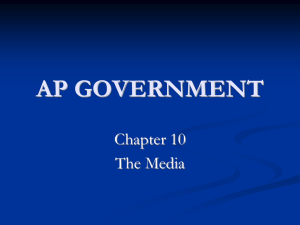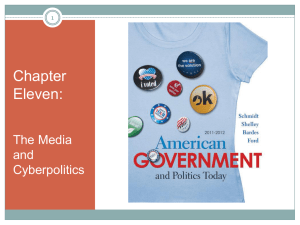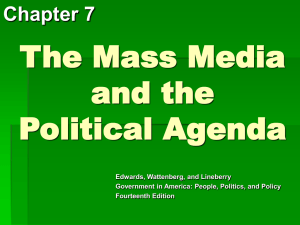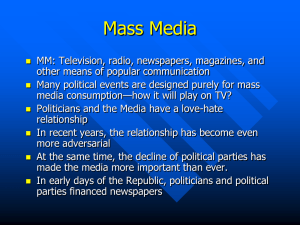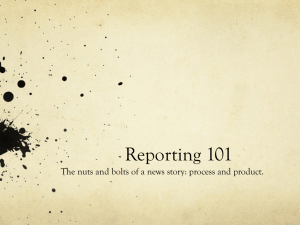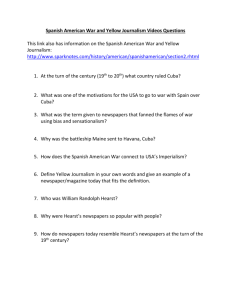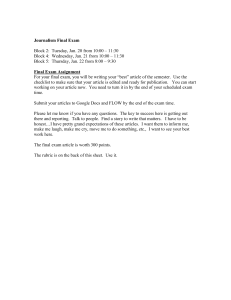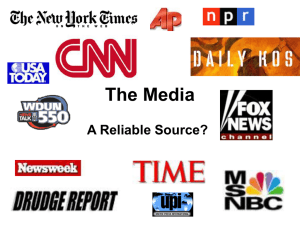10 - Vocabulary and Summary Mass Media
advertisement
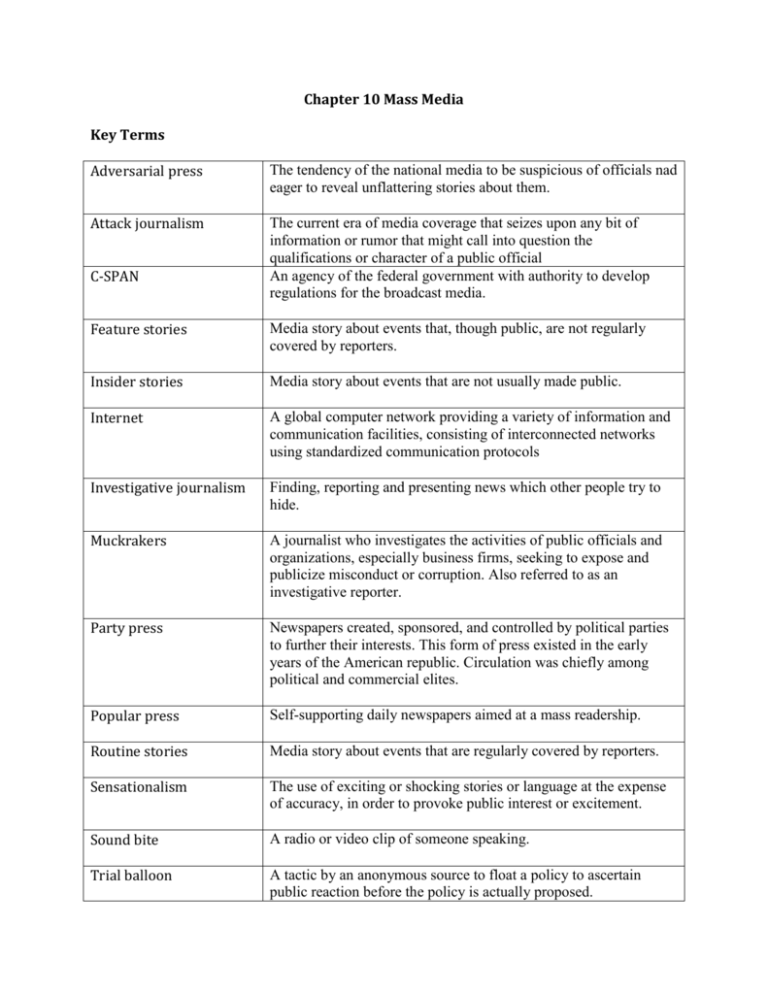
Chapter 10 Mass Media Key Terms Adversarial press The tendency of the national media to be suspicious of officials nad eager to reveal unflattering stories about them. Attack journalism The current era of media coverage that seizes upon any bit of information or rumor that might call into question the qualifications or character of a public official An agency of the federal government with authority to develop regulations for the broadcast media. C-SPAN Feature stories Media story about events that, though public, are not regularly covered by reporters. Insider stories Media story about events that are not usually made public. Internet A global computer network providing a variety of information and communication facilities, consisting of interconnected networks using standardized communication protocols Investigative journalism Finding, reporting and presenting news which other people try to hide. Muckrakers A journalist who investigates the activities of public officials and organizations, especially business firms, seeking to expose and publicize misconduct or corruption. Also referred to as an investigative reporter. Party press Newspapers created, sponsored, and controlled by political parties to further their interests. This form of press existed in the early years of the American republic. Circulation was chiefly among political and commercial elites. Popular press Self-supporting daily newspapers aimed at a mass readership. Routine stories Media story about events that are regularly covered by reporters. Sensationalism The use of exciting or shocking stories or language at the expense of accuracy, in order to provoke public interest or excitement. Sound bite A radio or video clip of someone speaking. Trial balloon A tactic by an anonymous source to float a policy to ascertain public reaction before the policy is actually proposed. Yellow journalism The use of sensationalism to attract a large readership for a newspaper. Chapter: 10 Mass Media (pgs. 170-175) The media have evolved as more sophisticated forms of communication have become available, changing the role of media in American politics. Government has some control over the media, but the recent trend of deregulation is changing what media are allowed to do. The media are the major source of information about the government for the American public, and they have a major impact on how politics are conducted. The media are often accused of bias in their reporting of government officials and activities. Section Title Summary of Key Ideas The Background and Structure of the Media Changes in the organization and technology of the media have had great impact on American politics. The party press: Newspapers created, sponsored, and controlled by political parties to further their interests. This form of press existed in the early years of the American republic. The popular press: Self-supporting daily newspapers aimed at a mass readership. Magazines of opinion: obtained by middle class; individuals who gained national recognition; journalists that spread real/alleged scandals about another, exposing contrary behaviors to public interest, are known as muckraker; magazines indicated rising levels of education and enlightenment in politics among Americans. Broadcast journalism: type of news reporting that is presented to the public electronically or by radio instead of being published in newspapers. The Internet: new era in media and politics; over 4/5 of all young Americans used the Internet; methods of campaign finance, facilitation between voters and political activist. Gatekeeper: The national press influences what subjects become Constitutional/Court Connection The freedom of press is protected under the First Amendment. Presidents are often known to reward and punish reporters based on their stories. Government Influence on the Media national political issues and for how long. Scorekeeper: The national press tracks political reputations and candidacies. Watchdog: The national press investigates personalities and exposes scandals. a. Newspapers are almost entirely free from government regulation. Newspapers can only be sued for libel, obscenity, or incitement to an illegal act. b. The Supreme Court has ruled repeatedly that there can be no prior restraint on published materials. c. The Supreme Court allows the government to compel reporters to divulge information in court if it bears on a crime. d. The Federal Communications commissions (FCC) issues licenses that must be renewed periodically. All radio stations and Television channels must have a license by the FCC. e. Candidates can use the media in campaigns but there are requirements that must be followed. Equal access must be provided for all candidates. Rates must be no higher than the cheapest commercial rate. Debates at one time had to include all candidates, but recent debates have been sponsored by the Commission on Presidential Debates and can be among only the major candidates. Fairness regarding debates remains a hotly contested Key freedom of press court cases: 1) Hustler v. Falwell: Larry Flint printed cartoons about Jerry Falwell in Hustler magazine. Falwell won and then Flint appealed. The Court said that the free flow of idea is extremely important in the U.S.public figures need to be prepared to be made fun of. 2) Haelwood v. Kulheimer: principal at a public school removed 2 articles from the school newspaper. The Court sided with the principal saying he could censor the paper in order to keep the type of environment that he wanted. 3) Near v. Minnesota: Jay Near published a scandal sheet in Minneapolis, in which he attacked local officials, charging that they were implicated with gangsters. Near won because the Court censorship is rarely constitutional and prior topic, particular inflaming third-party candidates and negotiators for candidates from the major parties. Effects of the Media on Politics a. Interest groups have used the media effectively to get a variety of issues on the national agenda. Studies indicate that television news stories affect the popularity of the presidents and that political commentary has a large effect. b. Today’s media focus far more on the president than any other public official. Modern press secretaries head large staffs, meet regularly with reporters, brief the president on questions he is likely to be asked, and attempt to control the flow of new coming from the White House. c. Congress has a history of being very conservative up until 1978. That is until C-Span in 1979,which gives gavel-to-gavel coverage of house proceedings. d. Compared to congress the Senate has been more open to the outsiders. Senate hearings have been broadcasting since 1950 and on C-Span since 1986. restraint is definitely unconstitutional. Interpreting Political News a. The number of people that feel that the news is very bias is increasing but there are still a number of people that believe they are objective. b. Leaks to the press are something that is not seen as uncommon. These leaks usually come from government officials that compete with other departments so they give the press weapons against the competitors. This has started a new generation of journalism, attack journalism. c. Attack journalism is when reporters hound the politicians and tend to bring a bad word to the press. Because of attack journalism there has been a growth in cynicism among the public towards the media. d. From the intense competition there has been a smaller share of the audience. Because of the press’ limited access it leads to more articles that include sensationalism. Sensationalism draws in more audiences and is cheaper than investigative journalism. e. Press releases, which are often uncontroversial and sterile, are another way to fight bias. f. As communication technology evolves, the role of the press in politics will continue to increase. Mass media will maintain a central role in linking average citizens to the government.

